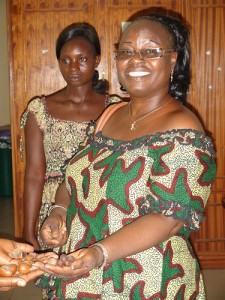Farmers groups, unions and women’s cooperatives are a powerful force in Africa. It’s difficult to estimate how many of these groups exist, but there are millions of farmers across the continent who have come together to grow and sell food or work on gaining better access to markets or ways to develop agro-tourism or conservation projects in their communities.

For women, especially, the groups can be an important resource for improving their skills and finding ways to increase their incomes.
“If a woman has a good idea, but doesn’t have the resources to implement it,” says Marceline Ouedraogo, the President of Burkina Faso’s rural women’s association, Songtaab-Yalgré, “it’s important to have the support of a group.” And when she started the Songtaab-Yalgré in 1990, which now has over one thousand members, she went door to door and woman to woman, asking them to join. “The biggest challenge,” she said, “was the husbands”—each woman had to get permission from her spouse to leave the house and meet with the other women.
But the men weren’t the only problem—many of the women who joined the group were illiterate. “We started,” says Marceline, “teaching women to read and write.” She found a training module in their local language and the women began having classes in a local school in the evenings. “When the children left for the day, we took over,” says Marceline.
After one year of getting basic reading and writing skills, the women asked one another “what are we going to do” with this group? They decided to start bringing in the different ingredients needed to make shea butter, but they didn’t know how to process the nuts. They didn’t have any money or donor support, says Marceline, but they decided “they were just going to do it on our own.”
“We went to our mothers to learn how to do it,” says Marceline. With their new knowledge the women began processing the arechete—or shea butter nuts—to make different products, including crèmes and lotions. The business—along with their skills and profit—grew and the women eventually opened their own processing and training center outside of Ougadougou. They now work with three thousand women in nearly a dozen villages and have 11 centers where they collect arechete for processing. All of the profits from the sale of shea butter—and peanut oil, soap, and other products the group is now making—are distributed equally among all the members.
The group has exported organic shea butter internationally for more than a decade. They protect and manage the 20,000 shea trees they collect nuts from using agro-ecological practices—they don’t use pesticides or artificial fertilizers, instead using natural methods of pest control and compost.
Marceline says that Songtaab is hoping to expand their “transformation activities” into creating more products from local foods, including nutritious juices for children and the elderly. “We want to go beyond what we’re producing now and expand,” says Marcelline. And there efforts aren’t going unnoticed. Songtaab won the Equator Prize in 2006—the prize” is awarded to recognize and celebrate outstanding community efforts to reduce poverty through the conservation of biodiversity.”
Songtaab will be featured in “Chapter 11: Harnessing the Knowledge and Skills of Women Farmers” in the forthcoming State of the World 2011: Innovations that Nourish the Planet.

Danielle Nierenberg, an expert on livestock and sustainability, currently serves as Project Director of State of World 2011 for the Worldwatch Institute, a Washington, DC-based environmental think tank. Her knowledge of factory farming and its global spread and sustainable agriculture has been cited widely in the New York Times Magazine, the International Herald Tribune, the Washington Post, and
other publications.
Danielle worked for two years as a Peace Corps volunteer in the Dominican Republic. She is currently traveling across Africa looking at innovations that are working to alleviate hunger and poverty and blogging everyday at Worldwatch Institute’s Nourishing the Planet. She has a regular column with the Mail & Guardian, the Kansas City Star, and the Huffington Post and her writing was been featured in newspapers across Africa including the Cape Town Argus, the Zambia Daily Mail, Coast Week (Kenya), and other African publications. She holds an M.S. in agriculture, food, and environment from Tufts University and a B.A. in environmental policy from Monmouth College.










